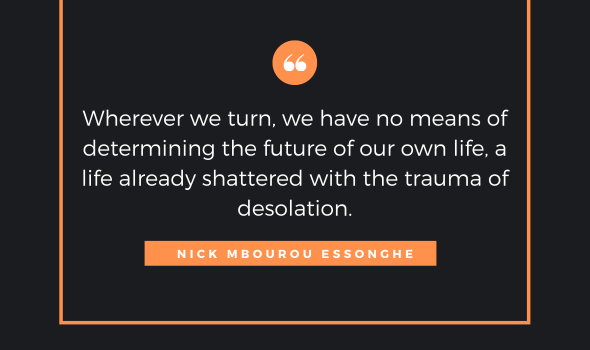The impact of the Covid-19 lockdown on asylum seekers and refugees
The impact of the Covid-19 lockdown on asylum seekers and refugees

The Covid-19 pandemic is a constant challenge for asylum seekers and refugees, who are already faced with the daily reality of living in an environment that is hostile to them. Asylum seekers and refugees are some of the most vulnerable groups during this pandemic – they already face an uncertain future and now they have few places to turn for help.
I arrived in London in April 2017 after fleeing my country (Gabon) due to my political affiliations. Since being in the UK, I have been unable to create new meaning for my life, to construct an existence and enjoy some form of self-determination. Here, I do not have the right to do anything and must wait on the authorities for everything. Even the ID card I was given by the Home Office wasn’t recognised when I tried to open an account at the Post Office. Being here as an asylum seeker is a mental challenge; sometimes you even doubt if you belong to the human species.
I know that life is a challenge. Wherever you live, life is tough. But what the asylum seeker must face is the hidden agenda of the authorities, seemingly playing games with us that destroy the social, economic and mental life of someone who was once stable and upright. Wherever we turn, we have no means of determining the future of our own life, a life already shattered with the trauma of desolation.
And then came Covid-19. As asylum seekers during this time, we are exposed to destitution and suffering. We live on just £37.75 per week (recently increased to £39.60) and in normal times this is hard. Asylum seekers shop in the same shops as everyone else in the UK. In the high streets of London, there are no shops that are just for the poor or for asylum seekers. With £39, even the PoundShop cannot sustain the life of an individual in London. So, before Covid-19, we relied on charities and various schemes and projects to support asylum seekers. We needed them to access the internet, to get food and clothing and money for public transport, for psychotherapy to help us deal with our trauma.
In its lack of support, the Government made it necessary for us to turn to those organisations. But during Covid-19, they mostly disappeared – and we got nothing (except an extra £1.85 per week) to help us.
It even feels as if, while the whole world has been fighting to find out what Covid-19 is and how to deal with it, the authorities that are responsible for us asylum seekers still find the resources to continue their destruction of our well-being. For example, many asylum seekers were relocated to hotels at the start of the lockdown. One of them was Roger, who is from Cameroon and was relocated from a very bad shelter to a Travelodge in London. The food was barely enough to survive on – three biscuits and a 125ml carton of apple juice for breakfast, while lunch was around 100g of rice, poorly cooked, a boiled egg and some unidentifiable stew. Another asylum seeker, Sola, said he had experienced something similar in a hotel where he was transferred.
While we can’t know the full details behind the tragic events in Glasgow a couple of weeks ago, it’s reported that the man shot dead by police had complained he was “very hungry” after being re-housed in the hotel and had threatened violence the day before. Whatever we think about this event, surely we can all agree that the right to live and to live a dignified life is important, and that if we are being provided with food in place of financial support, this should be enough to sustain us.
We must make sure that the Home Office and Mears are questioned, so we can find out exactly how they used their resources that should have been used to care for vulnerable, destitute communities.
Just because the lockdown is ending, this doesn’t mean the risks have disappeared for us asylum seekers. Covid-19 and the concomitant problems remain a potential death trap. And even if life were to go back to pre-Covid “normality”, this would still mean a life of trauma, isolation and uncertainty. When can we be human beings again? When can we be accepted, supported and enabled to find a path through the trauma and a light on the other side?


